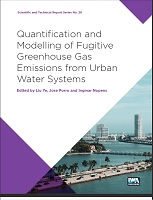Quantification and Modelling of Fugitive Greenhouse Gas Emissions from Urban Water Systems
Contributor(s)
Ye, Liu (editor)
Porro, Jose (editor)
Nopens, Ingmar (editor)
Collection
Knowledge Unlatched (KU)Language
EnglishAbstract
With increased commitment from the international community to reduce greenhouse gas (GHG) emissions from all sectors in accordance with the Paris Agreement, the water sector has never felt the pressure it is now under to transition to a low-carbon water management model. This requires reducing GHG emissions from grid-energy consumption (Scope 2 emissions), which is straightforward; however, it also requires reducing Scope 1 emissions, which include nitrous oxide and methane emissions, predominantly from wastewater handling and treatment. The pathways and factors leading to biological nitrous oxide and methane formation and emissions from wastewater are highly complex and site-specific. Good emission factors for estimating the Scope 1 emissions are lacking, water utilities have little experience in directly measuring these emissions, and the mathematical modelling of these emissions is challenging. Therefore, this book aims to help the water sector address the Scope 1 emissions by breaking down their pathways and influencing factors, and providing guidance on both the use of emission factors, and performing direct measurements of nitrous oxide and methane emissions from sewers and wastewater treatment plants. The book also dives into the mathematical modelling for predicting these emissions and provides guidance on the use of different mathematical models based upon your conditions, as well as an introduction to alternative modelling methods, including metabolic, data-driven, and AI methods. Finally, the book includes guidance on using the modelling tools for assessing different operating strategies and identifying promising mitigation actions. A must-have book for anyone needing to understand, account for, and reduce water utility Scope 1 emissions.
Keywords
Technology & Engineering; EnvironmentalDOI
https://doi.org/10.2166/9781789060461ISBN
9781789060461Publisher
IWA PublishingPublisher website
https://www.iwapublishing.com/Publication date and place
2022Grantor
Imprint
IWA PublishingClassification
Environmental science, engineering and technology


 Download
Download